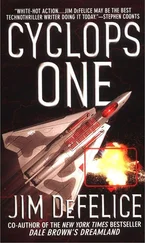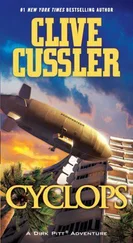Thomas Hoover - Project Cyclops
Здесь есть возможность читать онлайн «Thomas Hoover - Project Cyclops» весь текст электронной книги совершенно бесплатно (целиком полную версию без сокращений). В некоторых случаях можно слушать аудио, скачать через торрент в формате fb2 и присутствует краткое содержание. Жанр: Триллер, на английском языке. Описание произведения, (предисловие) а так же отзывы посетителей доступны на портале библиотеки ЛибКат.
- Название:Project Cyclops
- Автор:
- Жанр:
- Год:неизвестен
- ISBN:нет данных
- Рейтинг книги:4 / 5. Голосов: 1
-
Избранное:Добавить в избранное
- Отзывы:
-
Ваша оценка:
- 80
- 1
- 2
- 3
- 4
- 5
Project Cyclops: краткое содержание, описание и аннотация
Предлагаем к чтению аннотацию, описание, краткое содержание или предисловие (зависит от того, что написал сам автор книги «Project Cyclops»). Если вы не нашли необходимую информацию о книге — напишите в комментариях, мы постараемся отыскать её.
Project Cyclops — читать онлайн бесплатно полную книгу (весь текст) целиком
Ниже представлен текст книги, разбитый по страницам. Система сохранения места последней прочитанной страницы, позволяет с удобством читать онлайн бесплатно книгу «Project Cyclops», без необходимости каждый раз заново искать на чём Вы остановились. Поставьте закладку, и сможете в любой момент перейти на страницу, на которой закончили чтение.
Интервал:
Закладка:
Half scrambling, half rolling, he headed for the thicket of trees, occasionally loosing a round of covering fire down the hill. Then he felt the scratchy hardness of the low brush and threw himself into the bramble. Dirt spattered as rounds of fire-or was it flecks of granite?-ricocheted around him, and then he felt a nick across one shoulder-he was not sure from what. A couple more rounds cut past, but now they were going wide.
He collapsed into the dense bramble and tried to catch his breath. What next? The Uzi still had a half-full clip. Maybe he could hold them off.
He stilled his breathing and listened, but heard nothing. The mountainside was deathly quiet, so much so he could almost hear the crash of waves on the shore below. It was probably only wishful imagination, but the quiet gave hope he might temporarily be out of danger.
He turned and looked up the mountain, finally able to see it clearly. The near hillside was covered with brush, the only objects visible above the green being the tip of a high-tech jungle. SatCom had a hell of a communications installation. Outlined against the blue sky were huge parabolic antennas used for microwave uplinks, a phased-array transmission system for powering the space vehicles, a myriad of dishes for satellite uplinks and downlinks, and various other antennas used for conventional radio. It was all set inside a high-security hurricane fence with a gray cinderblock control hut at the near corner.
Well, he thought, with that battery of antennas, there's surely a way to do what has to be done next…
This time he wouldn't waste radio access with Maydays.
9:35 A.M.
As the landing announcement sounded through British Air flight 1101 from London to Athens, Isaac Mannheim took off his thick spectacles, wiped them futilely with a greasy handkerchief, settled them back, and stared down. The plane was now on final approach, and he had already taken down his flight bag and stuffed it under the seat in preparation, ready to march off.
Mannheim was professor emeritus at MIT, Department of Engineering, and he retained the intellectual curiosity of a mischievous schoolboy. He had the flowing white hair of a nineteenth-century European philosopher, the burning eyes of a Jules Verne visionary, the single-minded enthusiasm of a born inventor, the discursive knowledge of a Renaissance man, and the self-assurance of a true genius-which he was.
Wearing a tweedy checked suit, a frayed brown overcoat, smudgy horn-rims, and a Boston Red Sox baseball cap, he also looked every bit as eccentric as his reputation said. The baseball cap was tribute to another of his eclectic concerns-the statistics of that particular team. Those he kept on a computer file and subjected to daily updates.
As Issac Mannheim saw it, he was the undisputed father of Project Cyclops; Bill Bates was merely in charge of its delivery room down on Andikythera. It was a half-truth, perhaps, but not entirely untrue either. He had dreamed up the idea and proved in his MIT lab that it could work. The rest, he figured, was merely scaling it up-which any dimwit with half a billion dollars could do with ease. He had already seen to the hard part.
Mannheim liked to check in on his baby every other week, just to make sure that Bates-who was going to make a fortune off his idea-was doing it right. Although the long flight to Athens and then the helicopter ride down to Andikythera were starting to make him feel his seventy-five years, he did not really mind. When you're my age, he'd claim, you don't have time to sit around on your butt all day.
He always flew British Air from London rather than taking a direct Olympic flight from Boston, mainly because he was an Anglophile but also because he wasn't quite sure he trusted Greek maintenance. Isaac Mannheim was old school in all things.
As the tires screeched onto the asphalt, he glanced out the window again, marveling how small the Athens airport was. But then his mind quickly traveled on to other pressing matters: namely, the day's agenda. He was anxious to go over the power-up data number by number with Georges LeFarge. The young French Canadian had been his best student in Cambridge, ten years ago, and Isaac Mannheim was secretly pleased, very pleased, that Georges had been given a leading role in the project. Together, years ago, they had ironed out many of the technical problems in the system. The work back then had been done on a lab bench, and a shoestring, but LeFarge knew everything that could go wrong. With Georges as Director of Computer Systems here, Mannheim knew the project was in good hands, at least the crucial computer part of it.
When the doors opened, he was one of the first to step out of the BA 757 and down the steel stairway onto the runway. He reflected that he'd had a good flight this time, with only an hour layover in Heathrow's infamously crowded Terminal Four. Now, as the airport bus arrived to carry the bleary-eyed London passengers into the Athens terminal, he anticipated getting an early start on the day.
He glanced down toward the far end of the airport, the civilian aviation terminal, expecting to catch sight of Bates’ blue-and-white-striped Agusta helicopter. Funny, he couldn't see it today; usually you could.
It was odd; they were always here, waiting. Customary promptness was just one more example of how well that young Dr. Andros was handling the project. He chafed to admit it, but she was pretty damned good. Although he had long scoffed at the idea that women could compete successfully with male engineers, he had to admit she was as professional as any male project manager he'd ever worked with.
Carrying his overstuffed black briefcase in his left hand and his tattered nylon flight bag in his right, he waited till the airport bus was almost full before stepping on. Airport buses, he noted as an engineer, operated on the old-time LIFO computer storage principle: last in, first out. No random access.
And he was indeed first out as they pulled into the sheltered awning of the terminal. The Athens morning sun was already burning through the growing layer of brown haze. He thought ruefully how it would look from the south, down around Piraeus, as they flew out. From there Athens seemed to be encased in an ugly brown tomb.
World air quality was yet another of the topics weighing on his mind these days. It was, in fact, a frequent subject of the long letters he addressed to another former student, an average-IQ Danish boy majoring in physics whom he had seen fit to flunk in junior-year thermodynamics. Afterward Mannheim had taken the lad aside and bluntly suggested he might wish to consider a less intellectually demanding career path.
The advice had been heeded, and these days he was doing reasonably well at his cushy new job, down in Washington. Still, Isaac Mannheim felt it necessary to post the boy long typewritten letters from time to time concerning various avenues for self-improvement.
Yes, he had turned out reasonably well after all, considering, but he still needed to work harder. Don't be a slacker, John; nobody ever got ahead that way. The forty-second President of the United States, Johan Hansen, read his old professor's missives, usually written on the back of semi-log graph paper or whatever was handy, and dutifully answered every one of them. Maybe he was afraid he'd get another "F" and a humiliating lecture.
Isaac Mannheim stared around the half-filled terminal, wondering. The SatCom pilot usually met him right at the gate, but today nobody was there. Incompetent Greeks. This one, in fact, was particularly feckless: just out of the Greek Air Force with no real grasp of the value of time.
Or had Dr. Andros forgotten he was arriving? That was hard to imagine, since he had talked with her just before he left Cambridge. One thing you had to say for her, she never forgot appointments. Strange.
Читать дальшеИнтервал:
Закладка:
Похожие книги на «Project Cyclops»
Представляем Вашему вниманию похожие книги на «Project Cyclops» списком для выбора. Мы отобрали схожую по названию и смыслу литературу в надежде предоставить читателям больше вариантов отыскать новые, интересные, ещё непрочитанные произведения.
Обсуждение, отзывы о книге «Project Cyclops» и просто собственные мнения читателей. Оставьте ваши комментарии, напишите, что Вы думаете о произведении, его смысле или главных героях. Укажите что конкретно понравилось, а что нет, и почему Вы так считаете.












